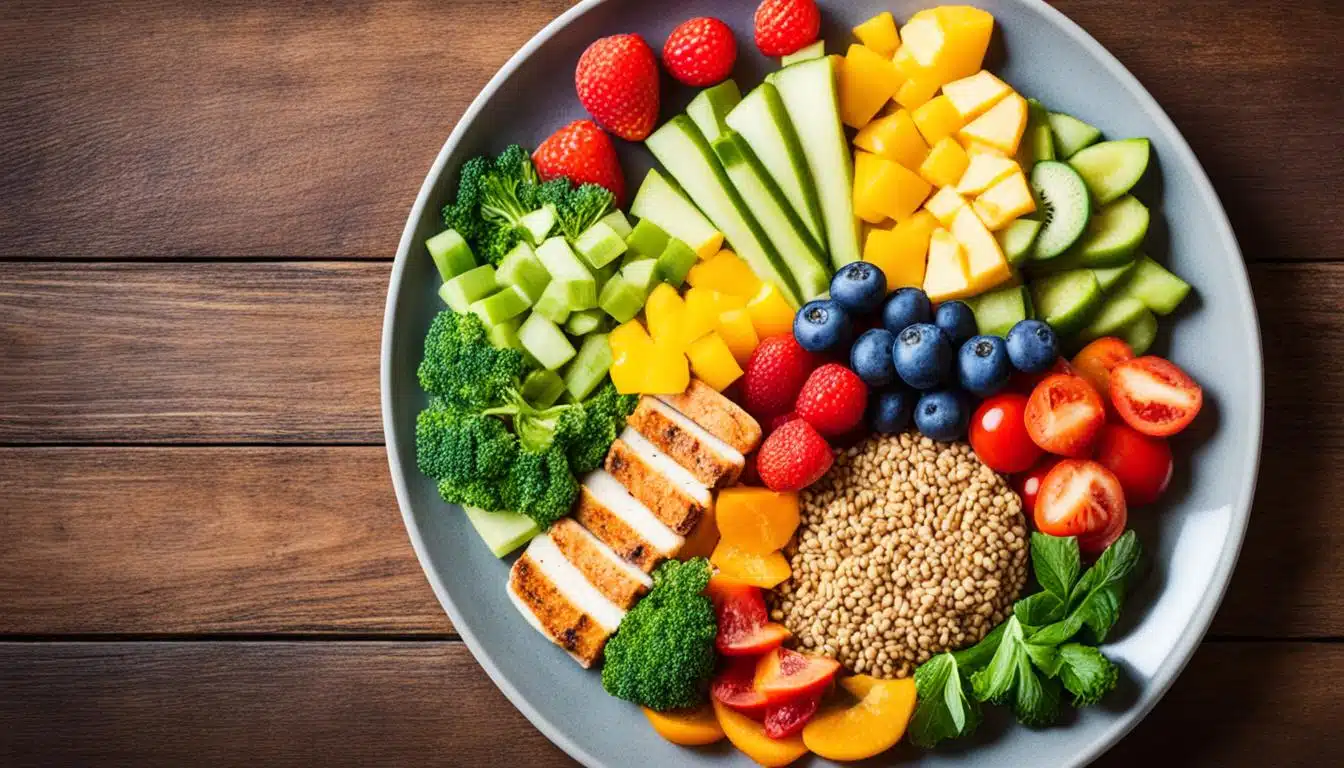Eating right is key to staying healthy and keeping chronic diseases at bay. You want to match the calories you take in with what you burn off through activity. This balance helps manage your weight, preventing an overload of fat.
If you eat more calories than your body uses, you’ll gain weight. And if you eat too few calories, you might lose weight. Finding this healthy balance is important for your overall well-being.
Key Takeaways
- Achieving a balance between calories consumed and calories expended is crucial for maintaining a healthy weight.
- Incorporating a variety of nutritious foods, such as whole grains, lean proteins, and fruits and vegetables, is essential for a balanced diet.
- Limiting unhealthy fats and added sugars can help reduce the risk of heart disease and other chronic conditions.
- Staying hydrated with water and other healthy beverages is important for overall health and well-being.
- Mindful eating and portion control can support weight management efforts.
Understanding Healthy Eating
Keeping a balanced diet is key for good health. It’s about keeping the calories in and out in check. You need to know how many calories you need, depending on how active you are. Eating more calories than you burn will make you gain weight, as your body stores it as fat.
On the flip side, eating too little can cause weight loss.
Balancing Calories Consumed and Expended
To stay fit, match the calories you eat with how much you exercise. Watch your portion size and plan your meals wisely. This way, you’ll keep a good diet that helps your health.
Importance of Nutrient Diversity
Nutrient mix is just as important as the calories. Add plenty of different,whole foods, including plant-based and superfoods. This helps you get essential vitamins, minerals, and antioxidants. Focus on foods rich in nutrients to stay healthy and lower the chance of getting sick.
Build Your Plate Around Fiber-Rich Foods
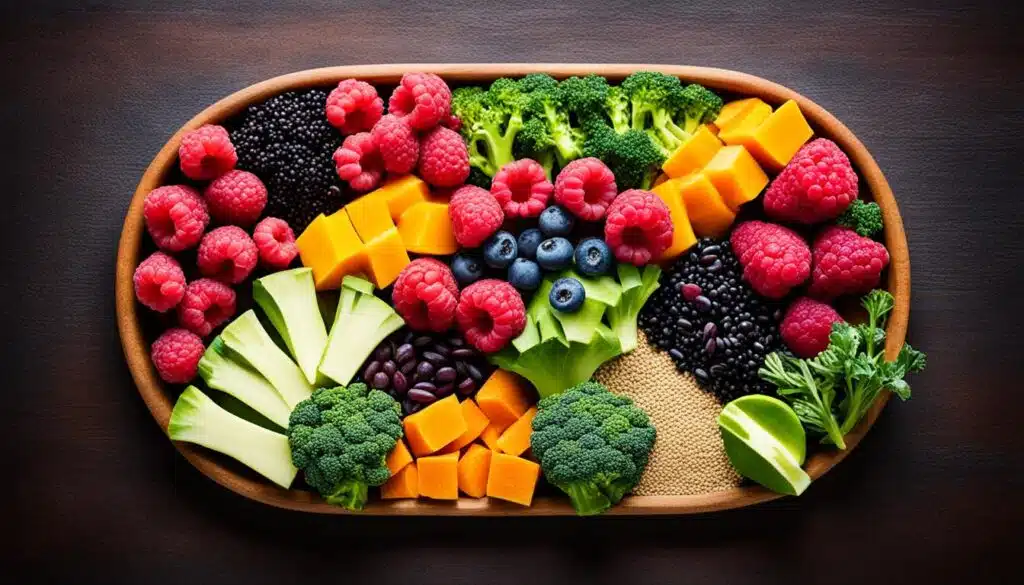
Starchy carbohydrates should fill just over one third of your plate. Think potatoes, bread, rice, and pasta. Go for whole grains and starchy vegetables rather than processed ones for more fiber and nutrients.
Whole Grains and Starchy Vegetables
Pick wholewheat pasta, brown rice, or potatoes with their skins on. They’re packed with more fiber and keep you satisfied longer. Including potatoes, sweet potatoes, corn, and peas offers even more variety and fiber to your meal.
Fiber Benefits and Sources
Fiber is essential for good health. It supports your digestive health, heart health, and blood sugar regulation. Apart from whole grains and starchy vegetables, find legumes, nuts, seeds, and fresh fruits and vegetables. Including these foods in your meals and snacks is key for a healthy you.
Prioritize Fruits and Vegetables
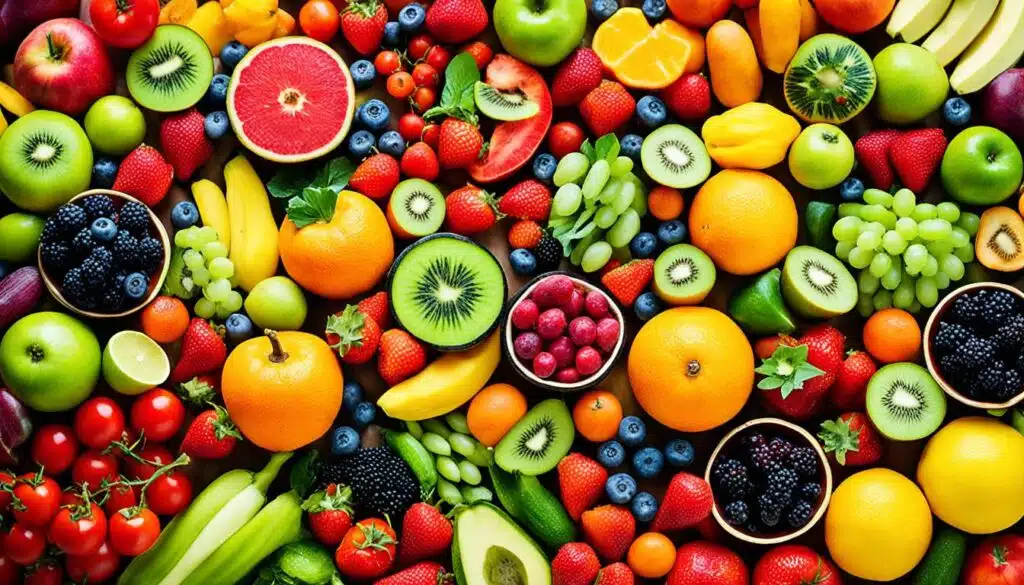
Eating many kinds of fruits and vegetables helps you stay healthy. These foods are packed with important vitamins, minerals, and antioxidants. They also have lots of fiber. All of this is great for your health and helps prevent sickness.
Aim for 5 Portions Daily
Try to eat at least 5 portions of fruits and vegetables each day. You can choose from fresh, frozen, canned, dried, or juiced. A portion is not a lot, just 80 grams of fresh or canned, or 30 grams of dried.
Variety in Colors and Types
To get all the important nutrients, eat different colored fruits and veggies. Including a variety of them ensures you get a full range of vitamins, minerals, and fiber. These things help keep you healthy and fight off diseases.
Making fruits and vegetables central to what you eat is really good for you. Make sure you get your 5 portions of colorful produce daily. This will help you be your healthiest self.
Include Lean Protein Sources

Protein is key for building and keeping muscle, making you feel full, and helping your body work well. You should make sure your meals have enough protein. Some good picks are lean and packed with nutrients:
Lean Meats, Poultry, and Fish
Lean meat, poultry, and fish are top picks for protein. Look for meat cuts that are not high in bad fat, such as skinless chicken and turkey. Choose oily fish like salmon and tuna for their good omega-3 fats. These fats are great for your heart.
Plant-Based Protein Options
If you don’t eat meat, there are plenty of protein-rich plants to enjoy. Soy foods like tofu and edamame, along with legumes, nuts, and seeds, can help you get enough lean protein. These plant-based foods help with muscle health and keep you full. They’re also good for managing your weight.
Limit Unhealthy Fats and Added Sugars
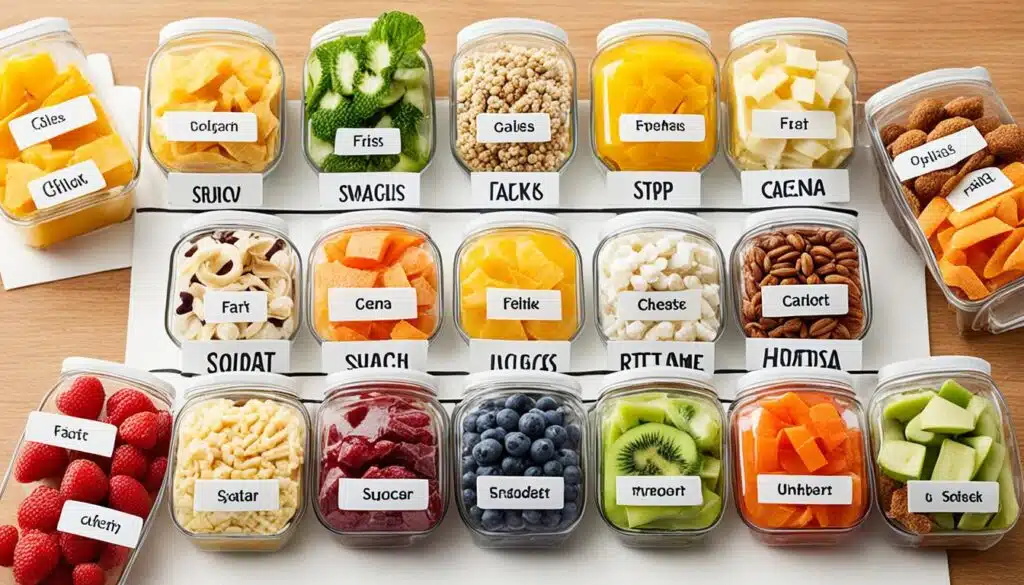
Dietary fats are key for health, but watch the kind you eat. Trans fats and saturated fats are bad and should be cut down. They can boost cholesterol and up the risk of heart disease.
Saturated and Trans Fats to Avoid
Harmful saturated fats come from fatty meats, full-fat dairy, and sugary drinks. Trans fats are in fried, baked, and other processed foods. Choose lean proteins, plant oils, and low-fat dairy to lower these fats.
Reading Food Labels for Added Sugars
It’s also crucial to check added sugars in what you eat. These sugars in processed foods and drinks can lead to weight gain and heart issues. Always scan food labels for nutrition data and sugar content.
Stay Hydrated with Healthy Beverages

Staying hydrated is key to being healthy and happy. The government says we should drink 6 to 8 glasses of fluid daily. This is on top of the water in the food we eat. Choose water as your main way to stay hydrated for good health.
Water as the Primary Hydrator
Water does a lot for your body. It keeps your temperature in check, moves nutrients around, and helps with balancing electrolytes. This keeps you from getting dehydrated, which can make you tired, give you headaches, and more. Try to sip water all day long. Carry a water bottle to remind you to drink.
Besides water, good choices include unsweetened fruit juices, vegetable juices, and smoothies. They give you extra nutrients and antioxidants. But, watch out for too much sugar in these drinks. Keep an eye on how much you drink and the sugar it has.
Drinking enough is vital for keeping your kidneys healthy, controlling your body’s temp, and making sure you work well all over. Start with water and add other healthy, non-alcoholic drinks to your day. This will keep your body and your health in top shape.
Healthy Eating for Weight Management
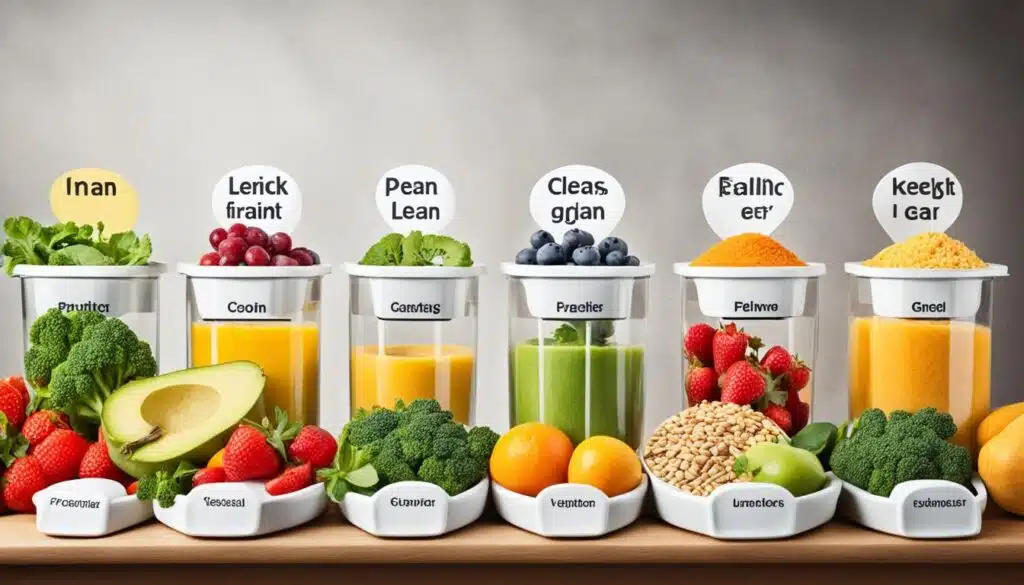
Achieving a healthy weight is key for good health. Eating foods full of nutrients helps in weight management. It’s important to control portions and eat mindfully. This helps build habits that keep weight off long term.
Portion Control and Mindful Eating
Controling how much you eat is vital. Watch the calories and nutrients in your food. This aids in making better food choices and not eating too much.
Try eating from smaller plates and pay attention to your hunger cues. Also, eating slowly and enjoying every bite can help you feel full. This stops you from eating too much.
Focusing on food taste, feel, and smell is part of mindful eating. It helps with weight management by making you eat more thoughtfully. Taking time to eat can help you spot when you’re full. This way, you don’t eat just because of habit or feelings.
Making these lifestyle changes every day can lead to better weight management.
Also Read : Discover The Trans-Formative Power Of Fitness For Enhancing Your Lifestyle
Plan and Prepare Nutritious Meals

Meal planning and smart grocery shopping are crucial for a healthy diet that’s also budget-friendly. Spend time making meal plans and checking you have the needed food preparation items. This makes it simple to whip up nutrient-rich meals that you enjoy.
Meal Planning and Grocery Shopping Tips
Look at your week and see when you can prep meals in advance. This saves time and ensures you always have healthy foods to grab. At the store, pick up a mix of whole foods like fruits, veggies, lean meats, and whole grains for complete meals.
Cooking Methods for Healthier Meals
Think about the way you cook to keep more nutrients in your food. Roasting, baking, and steaming are great because they don’t lose as many vitamins and minerals.
| Cooking Method | Nutrient Retention |
|---|---|
| Roasting | Retains up to 90% of nutrients |
| Baking | Retains up to 95% of nutrients |
| Steaming | Retains up to 90% of nutrients |
By following these tips for meal planning, shopping, and cooking, you help your family eat a range of nutritious and delicious meals. This is great for everyone’s health and happiness.
Conclusion
Healthy eating isn’t all about strict diets or constantly saying no to your favorite foods. It’s choosing to eat a mix of healthy foods to give your body what it needs. This way, your body works at its best. Making sure to eat a variety of nutrient-dense foods and watch how much you eat are key steps. Also, try to avoid too much unhealthy fats and added sugars. This will help you form a healthy eating pattern that boosts your overall health.
Eating a mix of foods that is good for you is really important for your health in the long run. It’s not about being perfect all the time. It’s about choosing to live a healthier life every day. By thinking about what you eat and how much, you can still enjoy food while taking care of yourself.
Healthy eating is something you keep working on, not just a goal you reach. If you plan a bit and are open to trying new, nutritious foods, you’ll make healthy eating a habit. This will help you manage what you eat and gain a balanced, sustainable diet for the future. Embrace this chance to improve your dietary habits and enjoy the many benefits for your long-term health.
FAQs
Q: What are some tips for healthy eating?
A: To eat healthy, focus on including a variety of foods and beverages from all the food groups in your diet. Choose nutritious foods and make healthy choices when shopping for groceries.
Q: Why is it important to eat a balanced diet?
A: Eating a balanced diet helps lower your risk of developing health issues such as high blood pressure, type 2 diabetes, and other chronic diseases. It also supports overall health and well-being.
Q: How can I incorporate healthy fats into my diet?
A: You can include healthy fats in your diet by consuming foods like avocado, nuts, seeds, and olive oil. These fats are important for brain health and overall wellbeing.
Q: What are some ways to make healthy choices when eating out?
A: When dining out, look for menu options that include a variety of foods, such as whole grains, lean proteins, and plenty of vegetables. Avoid items high in saturated fat and processed meats.
Q: How can I ensure I am following dietary guidelines for Americans?
A: You can ensure you are following dietary guidelines by incorporating a variety of foods in your meals, including fruits, vegetables, whole grains, lean proteins, and low-fat dairy products. Limit foods high in added sugars and sodium.
Q: Where can I find reliable information on nutrition and healthy eating?
A: You can visit the government websites of the Department of Health and Human Services or the Department of Agriculture for information on nutrition, dietary guidelines, and healthy eating plans.
Q: How does eating a healthy diet contribute to overall well-being?
A: Eating a healthy diet provides the essential nutrients your body needs to function properly, supports a healthy weight, reduces the risk of chronic diseases, and boosts energy levels for physical activity.
